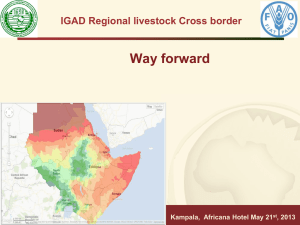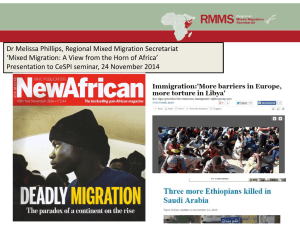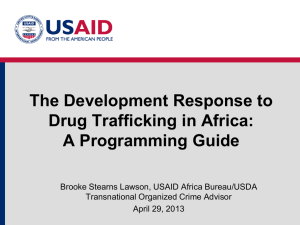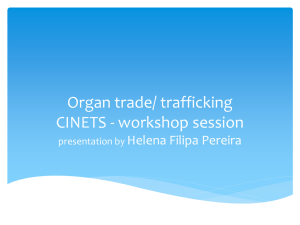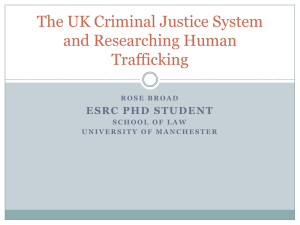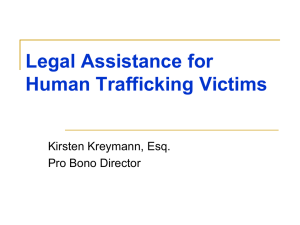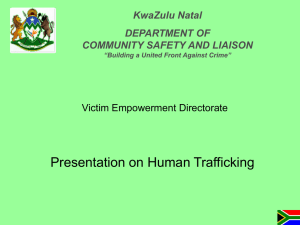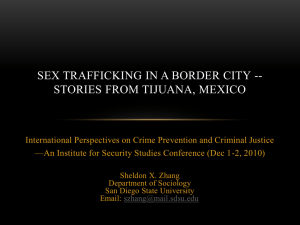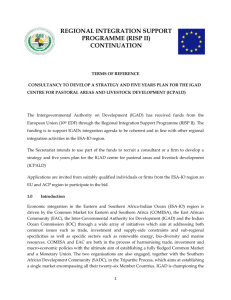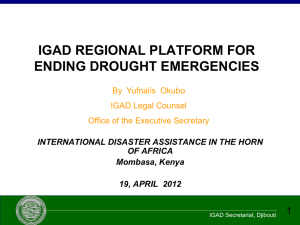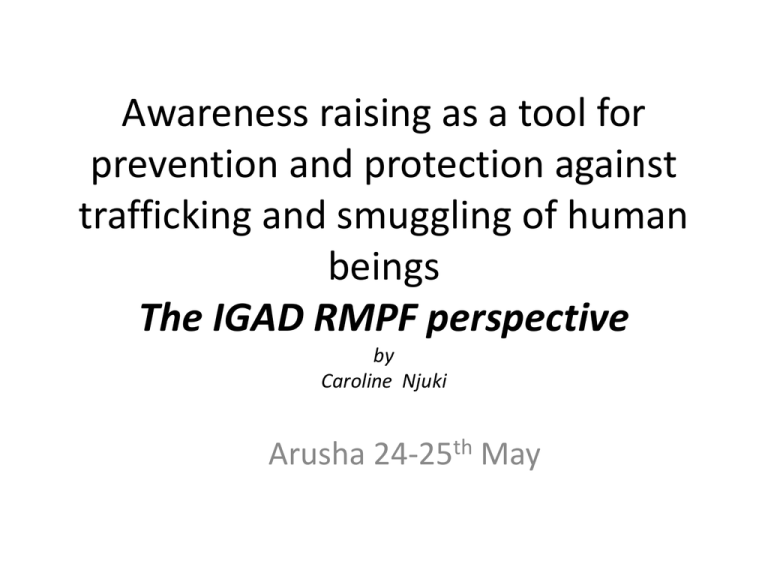
Awareness raising as a tool for
prevention and protection against
trafficking and smuggling of human
beings
The IGAD RMPF perspective
by
Caroline Njuki
Arusha 24-25th May
Smuggling and TIPs in the IGAD region
• The IGAD region has experienced internal and international
displacement as a result of civil strife and natural disasters. This has
created vulnerable populations amongst them women and children
who have fallen prey to trafficking in the hope for a safer, better
existence.
• There are also those who have approached existing smuggling
cartels to facilitate their movement especially to the middle east
and Gulf states and a final destination in continental Europe.
• Others have been deceived of existing ‘’greener pastures’’ and
lucrative jobs abroad only to find themselves trapped in
enslavement and unable to return to their countries of origin as
often their travel documents are confiscated.
• Those who finally may be able to return are afraid of the
perceptions that will meet them back home and the uncertainty of
the realities they will return to.
•
i
Ctn..
• Irregular migration exhibited through trafficking and
smuggling amongst other forms is intertwined with other
aspects of migration like labor migration and border
management. It therefore can not be handled in separation
but requires the concerted efforts of all responsible
government departments and agencies.
• At border crossings, victims of trafficking come across
immigration and security officers. There is therefore a great
need to build the capacity of these officers in identifying
and referring victims of trafficking to relevant assistance.
• There is also the crucial role of investigation, prosecution
and victim and witness protection in line with the 3Ps
(4ps?) approach.
• The existence of legal framework at member states
level to combat TIPs is the first crucial step. The AU
2006 Migration Framework and the Ouagadougou Plan
of Action provide insight and guidelines to member
states on this.
• IGAD member states are making efforts to have
legislation that provides for investigation, prosecution
and protection of victims and witnesses.(e.g. Kenya has
a new Counter Trafficking law) There is a need for
these policies to be harmonized at the regional level as
TIPs and smuggling affects multiple countries with each
acting as an origin, transit or destination country. The
IGAD RMPF provides a framework for such
harmonization.
IGAD’s implementation of AU.COMMIT and anti
trafficking efforts in the context of its Migration Policy
Framework
• The IGAD RMPF is inspired by the AU Migration policy
Framework for Africa adopted in Banjul in 2006.
• The draft was subjected to a validation workshop in
March and will be tabled to the IGAD council of
ministers for possible adoption
• The RMPF addresses amongst other issues; labor
migration, border management, irregular migration,
forced displacement, internal migration, migration
data, migration and development, migration and
environment amongst others.
• Migrant smuggling and human trafficking are given
attention under irregular migration.
Provisions to address migrant
smuggling in the IGAD RMPF
The framework provides for;
1. Strengthening national policy, structures and laws to establish
coordinated and integrated approaches at national level through
among others, incorporating and harmonizing into national
legislation the UN convention against trans-national organized
Crime ad its additional protocols
2. Development of common regional counter measures that
incorporate considerations to encourage more legal channels and
orderly migration, dismantle international organized criminal
syndicates, prosecute smugglers and others involved in such
activities while at the same time provide humane treatment for
smuggled migrants
3. Strengthen the IGAD RCP and dialogue on irregular migration to
promote greater policy coherence at the national, IGAD and IGAD
neighboring REC levels
4. Reinforce and encourage joint cross border patrols
between IGAD MSs and between the later and MSs of
neighboring RECs
5. Adopt comprehensive information collation systems
on smuggling to facilitate the tracking and
dissemination of information on the trends, patterns
and changing nature of smuggling routes as well as
the establishment of databases. These are meant to
treat smuggled migrants as victims of a crime rather
than criminals affording them protection and
assistance
6. Focus attention on discouragement and eventual
elimination of child smuggling in individual and
between IGAD member states as well as between the
latter and MSs of neighboring RECs
Human trafficking
Noting that trafficking involves the victim being deprived of
his/her will and is forced into slavery like conditions or
involuntary servitude; the RMPF recommends the following
strategies;
1. Strengthen national policy, structures and laws in order to
establish a coordinated and integrated approach at
national level by incorporating pertinent international
instruments; the UN convention Against transnational
Organized Crime and its trafficking protocol (2000),
protocol to prevent, suppress and Punish Trafficking in
Persons especially women and children and the Protocol
against the smuggling of Migrants by Land, Sea and Air
and Convention 182 of the ILO on the worst forms of child
labor
2.
3.
4.
Member states of IGAD are encouraged to adopt all international
instruments that sanction the trafficking in narcotic drugs and
psychotropic substances as addressed in (i) 1961 UN single
Convention on narcotic drugs (ii) the 1971 UN Convention of
Psychotropic substances and (iii) the 1998 UN Convention on Illicit
Trafficking in Narcotic Drugs and Psychotropic substances
Development of common regional counter measures based on a
spirit of solidarity among IGAD Mss and with a focus on the
human rights of trafficked victims including harmonization of
immigration laws; strengthened and modernized border
management, cooperation and coordination between concerned
ministries, particularly state security agencies, greater efforts to
dismantle international organized criminal syndicates, signing of
bilateral and multilateral agreements and prosecuting traffickers
and others involved in such activities
Reinforcement of information gathering systems relating to
trafficking to facilitate dissemination of information on the
changing nature of trafficking routes and the establishment of
databases on convicted traffickers and on missing persons who
are presumed to be victims of trafficking
5. Increase awareness on the dangers inherent in
irregular migration from countries of origin through
transit countries to those of destination, providing
opportunities for the citizens of the three sets of
countries to report suspected cases and to make
informed choices
6. Pursue and develop preventive action through
intensive information campaigns in the countries of
origin, transit and destination
7. Urge IGAD MSs to condemn in very strong terms sex
tourism and prostitution in countries of destination
thereby discouraging trafficking in woman and
children.
8. Strengthening Law enforcement measures to curb
activities of traffickers, imposing stiffer penalties to
perpetrators
Other regional interventions
• The East Africa Migration routes study conducted in 2008 aimed amongst
others at identifying migration routes and in particular possible routes
used by traffickers. A study on the migration routes in the ESA region will
be commissioned by IGAD by the end of June. This will build on the EAMR
to assist MSs adopt relevant interventions
• The IGAD protocol on extradition, -IGAD wide mutual legal assistance and
extradition agreement -aims at assisting in the prosecution of those
involved in transnational crime including smuggling and trafficking in
persons
• The ongoing mixed migration intervention spearheaded by IOM and
UNHCR in the IGAD region is addressing trafficking through prevention via
information campaigns and awareness raising, offering protection and
assistance to victims. There is a great need to also focus efforts on building
judicial capacity for investigation, prosecution and victim and witness
protection.
• The IGAD Regional Migration Coordination Committee once adopted will
provide a channel through which IGAD immigration chiefs can share
information on trafficking and human smuggling and also exchange and
deliberate on best practices.
Conclusion
• IGAD takes note of the continuing challenge to human
security posed by smuggling and trafficking of Persons
and supports the AU.COMMIT and all other efforts by
different stakeholders geared towards addressing this
issue.
• IGAD will therefore continue to work with and urge
member states to increase efforts towards combating
human smuggling and trafficking in Persons and
especially through awareness raising coupled with
strengthening investigation, prosecution and
protection of victims and witnesses.
Thank you.

